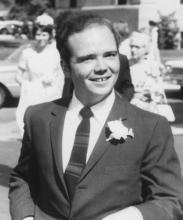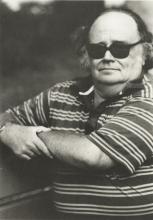Neill K. Buckley '63
Neill Buckley died May 27, 2006, at an assisted living facility in New Jersey, of a heart attack. He was 65 and had no known surviving family. Neill's legacy, in addition to the fond memories of his classmates and friends, consists of his prolific poetry, some of which he published in 1993 in a book entitled "The Asp and the Angel Have Given Me Their Tongues." A copy of the book will be kept at the Amherst College Library, along with an archive of unpublished works, some of which are original manuscripts, and letters by Neill and others giving details of his life and work.
Neill got his B.A. in English at Amherst in 1963 and an M.A.in English at the University of Connecticut. He worked for some years as a surveyor, and as an English teacher. Most of his adult life, Neill lived in Woodside, NY with his mother, Dorothy, surviving on welfare in severely impoverished circumstances. Eventually diagnosed as schizophrenic, he suffered from severe panic attacks, asocial behavior, and tormenting voices, and was under medication most of his later years, with heart trouble and diabetes adding to his plight. When Dorothy died at age 92, Neill was placed in a series of assisted living facilities. Despite these very difficult conditions, he continued to produce poetry until his death.
Amherst College and his friends there meant a great deal to Neill, and he kept in occasional contact by letters and phone calls. Some remembrances:
From John Emigh (photo shows Neill as best man at John's wedding):
 |
From Jerry Cohen:
Neill and I roomed together junior year in Valentine Hall. I particularly remember two happy events. First, Neill, Roger Sale, and I saw the fifth game of the 1962 Laker-Celtic NBA finals. Neill was dazzled by Elgin Baylor, who scored 61 pnts. Second, I remember pacing around our room, reading paragraphs from Middlemarch so Neill could write his English paper on the novel, which he hadn't read. He was good at throwing around phrases like "commensurate with Man's capacity to wonder." I always wondered how he got such good grades on these papers. I think Neill spent some of his happiest times with us at Amherst.
From Dave Lesser:
Neill ... was a good friend at college. I lost track of him years ago-- he had had a very difficult life, and spent a good bit of time in hospitals. He had little or no money, and existed pretty much on social security disability payments. When he wasn't in the hospital he was often in group homes in the New York - New Jersey area. He was difficult to keep in touch with, partly because he bounced around so much, but also, I'm afraid, because it took so much effort to stay connected. ... It was a sad life, because so much potential was swallowed up by his illness.
From Tom Morton:
Remembering Neill Buckley: One time at Amherst he was perplexed by a course in metaphysics, particularly frustrated by Gilbert Ryle’s "The Concept of Mind." His good friends were very concerned. To ease his philosophical mind, we took direct action and corrected the offending volume by "gluing the pages shut and stabbing the poor book to death for the torment it had caused!" (quote as remembered by John Emigh) Neill had mixed feelings about that violence. Later in life, he also had mixed feelings about the poet W.S. Merwin. On one hand he admired Merwin’s work to excess; on the other he harbored some feelings of envy. This ambivalence surfaced when he named his dog Merwin. Neill Kerry Buckley is remembered for his beatific gap toothed smile, his innocence and his poet’s deep sensibility.
From Steve Woolf:
After my assigned freshman (Pratt North) roommates Steve Parker and Ralph Hanna moved out so they could get some work done (I was a wild one!), Neill Buckley moved in, by choice! We got along famously. I think Neill was instrumental in bringing me to the epiphanies of English One - the life-altering experience that the core curriculum was designed for --we shared so much joy playing with the assignments. After Amherst he'd call every year or so, and around 1990 he asked me to help with his book, by entering his poems into a word processor. I happily received many manuscripts and sent them back with discs. After that we had little contact and I was not aware of his death until our recent reunion, when I saw his name in the list. I was not surprised, but the missing write-up saddened me greatly. A little research has turned up many fond memories, a few copies of the book and some excellent commentary on his life and work by Neill's close friend and poet, Theodore Schroetter of Jackson Heights, NY, to whom I am very grateful, both for the information and for the loving appreciation, care and comfort he and his friend Victor Federico provided Neill in his final years. The following poem, which I believe is Neill's only other published work (again, thanks to Ted Schroetter), tells his life story in his own words:
 |
Untitled
My whole life
I was swimming
listening beside
the daylight world
like a dolphin
beside a boat.
no -- swallowed up
young, like Jonah
in the red room
behind that curving
smile for the
other side.
but kept, not spat
out, kept for love
-- not for anything
I did or had -- I
had nothing but our
inside outside,
smile skin
my paper & pen . . .
but I was made for
this listening --
lightness would not
last if it was not used
up on the lyre
Neill Buckley
North Coast Literary Review, Issue No. 4, 2008
Photo c. 1993 by R Feramisco